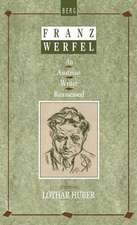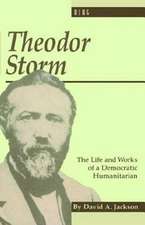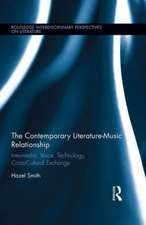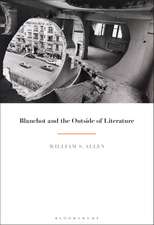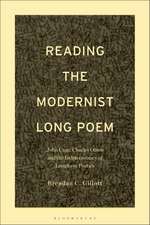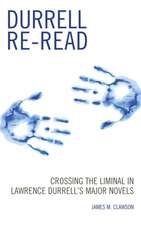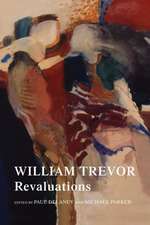Samuel Beckett and the Second World War: Politics, Propaganda and a 'Universe Become Provisional': Historicizing Modernism
Autor Dr William Daviesen Limba Engleză Paperback – 29 iun 2022
| Toate formatele și edițiile | Preț | Express |
|---|---|---|
| Paperback (1) | 198.12 lei 6-8 săpt. | |
| Bloomsbury Publishing – 29 iun 2022 | 198.12 lei 6-8 săpt. | |
| Hardback (1) | 569.37 lei 6-8 săpt. | |
| Bloomsbury Publishing – 9 dec 2020 | 569.37 lei 6-8 săpt. |
Din seria Historicizing Modernism
- 14%
 Preț: 540.31 lei
Preț: 540.31 lei - 30%
 Preț: 600.06 lei
Preț: 600.06 lei - 30%
 Preț: 602.11 lei
Preț: 602.11 lei -
 Preț: 447.42 lei
Preț: 447.42 lei - 30%
 Preț: 715.42 lei
Preț: 715.42 lei - 30%
 Preț: 509.93 lei
Preț: 509.93 lei - 13%
 Preț: 237.84 lei
Preț: 237.84 lei - 22%
 Preț: 259.07 lei
Preț: 259.07 lei - 13%
 Preț: 255.76 lei
Preț: 255.76 lei - 22%
 Preț: 777.06 lei
Preț: 777.06 lei - 22%
 Preț: 257.68 lei
Preț: 257.68 lei - 13%
 Preț: 257.97 lei
Preț: 257.97 lei - 13%
 Preț: 256.12 lei
Preț: 256.12 lei - 22%
 Preț: 258.59 lei
Preț: 258.59 lei - 13%
 Preț: 256.29 lei
Preț: 256.29 lei - 13%
 Preț: 258.42 lei
Preț: 258.42 lei - 30%
 Preț: 716.56 lei
Preț: 716.56 lei - 22%
 Preț: 232.34 lei
Preț: 232.34 lei - 22%
 Preț: 257.32 lei
Preț: 257.32 lei - 13%
 Preț: 228.85 lei
Preț: 228.85 lei - 30%
 Preț: 657.22 lei
Preț: 657.22 lei -
 Preț: 259.07 lei
Preț: 259.07 lei - 13%
 Preț: 258.42 lei
Preț: 258.42 lei - 22%
 Preț: 258.42 lei
Preț: 258.42 lei - 13%
 Preț: 257.03 lei
Preț: 257.03 lei - 30%
 Preț: 717.05 lei
Preț: 717.05 lei - 13%
 Preț: 256.20 lei
Preț: 256.20 lei - 22%
 Preț: 259.25 lei
Preț: 259.25 lei - 30%
 Preț: 773.81 lei
Preț: 773.81 lei -
 Preț: 237.75 lei
Preț: 237.75 lei - 23%
 Preț: 236.27 lei
Preț: 236.27 lei - 13%
 Preț: 257.12 lei
Preț: 257.12 lei
Preț: 198.12 lei
Preț vechi: 258.06 lei
-23% Nou
Puncte Express: 297
Preț estimativ în valută:
37.91€ • 41.35$ • 31.97£
37.91€ • 41.35$ • 31.97£
Carte tipărită la comandă
Livrare economică 24 aprilie-08 mai
Preluare comenzi: 021 569.72.76
Specificații
ISBN-13: 9781350196575
ISBN-10: 1350196576
Pagini: 256
Ilustrații: 8 bw illus
Dimensiuni: 156 x 234 x 18 mm
Greutate: 0.36 kg
Editura: Bloomsbury Publishing
Colecția Bloomsbury Academic
Seria Historicizing Modernism
Locul publicării:London, United Kingdom
ISBN-10: 1350196576
Pagini: 256
Ilustrații: 8 bw illus
Dimensiuni: 156 x 234 x 18 mm
Greutate: 0.36 kg
Editura: Bloomsbury Publishing
Colecția Bloomsbury Academic
Seria Historicizing Modernism
Locul publicării:London, United Kingdom
Caracteristici
Explores Beckett's experiences in Nazi Germany, occupied and post-liberation France and neutral Ireland
Notă biografică
William Davies is a research fellow at the University of Reading. With Helen Bailey, he is the editor of Beckett and Politics (2020). He is an English editor of LONGITUDINES magazine.
Cuprins
Series Editor PrefaceIntroduction Chapter One - Beckett and the Second World War Chapter Two - Beckett, War and the Everyday Chapter Three - Revolution and Revulsion: Beckett and Vichy France Chapter Four - Beckett and Irish Neutrality Chapter Five - The Language of Recovery: Beckett and France after the Liberation Chapter Six - Beckett and War Writing Epilogue Bibliography Index
Recenzii
[Beckett's] life between 1939 and 1945-6 has been well-documented ... but William Davies adds much detail, and his book is certain to become the standard work on the subject. But he has done far more than provide new information: he adds fresh strands to the narrative. His book explores, for instance, the issue of Vichy's Révolution nationale and Beckett's sarcastic depiction of the Pétain paradox as a 'poor old misled man and hero of Verdun' (p. 78). This is followed by a brilliant exposé of Beckett's relationship to Irish neutrality and a fine analysis of his greatest poem 'Saint-Lô' (1946).
William Davies's Samuel Beckett and the Second World War is not only an excellent book; it is a necessary one-a book that puts to rest the notion, long operative in Beckett studies, that Beckett's oblique fiction, drama, and poetry deal with large abstract philosophical questions rather than historical realities. Davies documents, step by step, the subtle and complex treatment, in Beckett's writings, of the frightening politics of pre-war Nazi Germany and the mendacities of Vichy France, of life during the Resistance years, of his response to neutral Ireland, and finally to the postwar tension between Gaullist humanism and the Marxism of the intellectual Left, neither of which Beckett found palatable. Davies's is revaluative criticism at its most enlightening.
William Davies' Samuel Beckett and the Second World War argues, persuasively, that Beckett's mature work is set in the shadow of war; although the texts might not refer to it directly, WW2 and its aftermath are woven into the texture of Watt, Godot, and the Trilogy. Davies traces the impact that conflict had on the evolution of Beckett's art, and its traces in the maimed, solitary figures in his theatre and prose. Davies makes a compelling case; that Beckett's work is profoundly shaped by war, and its impact on our idea of the human. This study will be a crucial part of discussions on the relation between Beckett's work and the tumultuous events through which he lived.
This deep and original re-examination of Samuel Beckett's experience in occupied France during World War Two is a revelation, a book that opens so many new vistas onto Beckett's creative breakthrough, and the gestation of Waiting for Godot, Endgame and the post-war prose. A stunning debut.
Elegantly synthesizes a rich history of Vichy France.
William Davies's Samuel Beckett and the Second World War is not only an excellent book; it is a necessary one-a book that puts to rest the notion, long operative in Beckett studies, that Beckett's oblique fiction, drama, and poetry deal with large abstract philosophical questions rather than historical realities. Davies documents, step by step, the subtle and complex treatment, in Beckett's writings, of the frightening politics of pre-war Nazi Germany and the mendacities of Vichy France, of life during the Resistance years, of his response to neutral Ireland, and finally to the postwar tension between Gaullist humanism and the Marxism of the intellectual Left, neither of which Beckett found palatable. Davies's is revaluative criticism at its most enlightening.
William Davies' Samuel Beckett and the Second World War argues, persuasively, that Beckett's mature work is set in the shadow of war; although the texts might not refer to it directly, WW2 and its aftermath are woven into the texture of Watt, Godot, and the Trilogy. Davies traces the impact that conflict had on the evolution of Beckett's art, and its traces in the maimed, solitary figures in his theatre and prose. Davies makes a compelling case; that Beckett's work is profoundly shaped by war, and its impact on our idea of the human. This study will be a crucial part of discussions on the relation between Beckett's work and the tumultuous events through which he lived.
This deep and original re-examination of Samuel Beckett's experience in occupied France during World War Two is a revelation, a book that opens so many new vistas onto Beckett's creative breakthrough, and the gestation of Waiting for Godot, Endgame and the post-war prose. A stunning debut.
Elegantly synthesizes a rich history of Vichy France.






